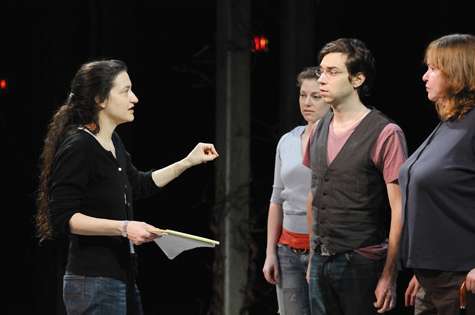
PURELY VERBAL OPERA Milles with Rebecca Gibel, Karl Gregory, and Janice Duclos. |
But what about this matter of throwing a saddle on an old warhorse again? Well, the rider this time around thinks that the play is still as frisky as a colt. She hasn't directed this before, but she has seen it five or six times."There is a lot of surprise in this play," says Beth F. Milles (pronounced Mill-is), the director. This is her first venture on the Trinity Rep stage. It's an especially exciting opportunity for her, because she came to town last August to head the MFA directing program of the Brown/Trinity Rep Consortium.
Written in the Victorian England of 1895, the storyline revolves around the double lives of two aristocrat friends who, for social convenience, pretend to have an ill friend and a wastrel brother, respectively, in the city and the country, to allow each to leave whichever location they are in at a moment's notice. If that sounds complicated, think of the double life of Oscar Wilde himself, whose homosexuality was unmasked almost immediately after this play, his last, opened. Eventually he went to jail, and his dual life fell apart.
Milles comes across as curious and intense when talking about Earnest.
"In most plays," she says, "someone comes in, reveals information and changes everyone's life, and then the play pretty much ends. In this play, it keeps happening. Why he's breaking the form is that he keeps bringing people in with revelatory information that changes the whole world.
"In the first act, Jack is saying, 'My name isn't Ernest, it's Jack.' What? Everything I knew about you is gone. The next one is: 'Your brother's here.' 'I don't have a brother.' And the last one is: 'I am Ernest.'
"Stylistically, he was breaking the form," she says. "It's farce and it's comedy, and certainly he was building off of the success of Gilbert & Sullivan or the operetta."
But, Milles adds, while audiences could readily accept extreme comedy with the cushion of music, Wilde was extreme with language alone, sort of playing without a net.
"What I tell everyone is a quote that I've been walking around with in my head since the first day of rehearsal," Milles says, "which is the Auden quote about this play: 'It's the only purely verbal opera in the English language.'
"It is a verbal opera. I mean, just that the language is surprising, and the characters are going in one direction, then they land and someone picks it up and takes it somewhere else."
Milles's solid background in improvisational and physical theater is going to come in handy.
"Always anything anyone says should be married to a physical impulse, whether it's to walk away from someone or walk to someone," she says. "Sometimes in theater you can watch a play and not see those impulses interacting at the same moment. And so I'm always looking to bring those impulses into the same moment, where the verbal and the physical are integral."
Milles came here from Ithaca, leaving a tenured position at Cornell University because, with two young children, she was tired of traveling hither and yon to direct plays. Teaching keeps her honest and fresh, she says. To hear her talk about what she's been trying to get across to her "really hard-working" MFA students is to hear about her own approach to directing Earnest.
She wants them "to sharpen their individual points of view, to be adventuresome, to follow their impulses — if they're going to be directors who are asking actors to do it, they have to do that as well.
"Our program really caters to strong individuals, to really nurturing that kind of fearless approach to text," Milles says. "There's not just one way to do it. Our program is very collaborative with the actor, because that is the foundation of this theater."